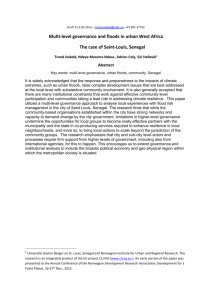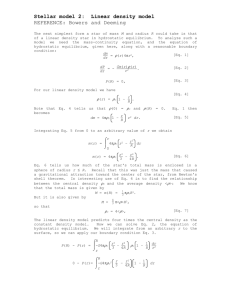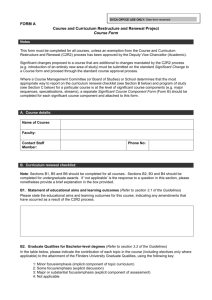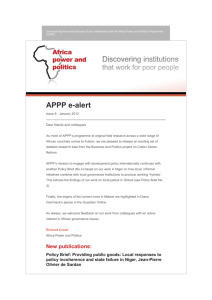APPP e-Newsletter
advertisement
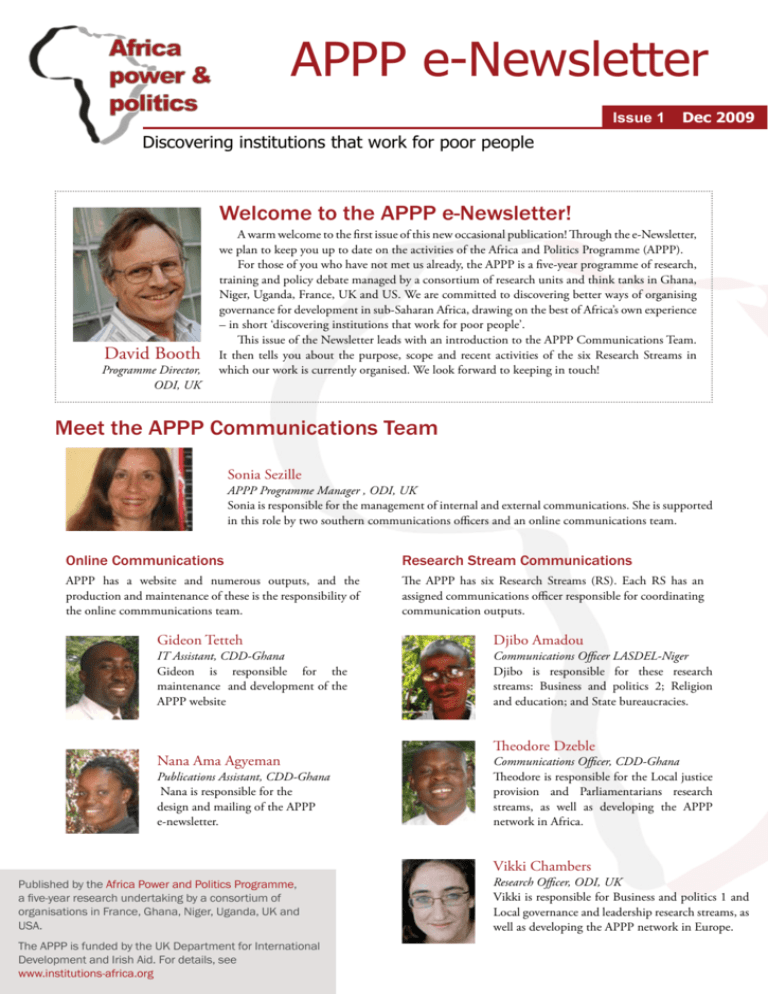
APPP e-Newsletter Issue 1 Dec 2009 Discovering institutions that work for poor people Welcome to the APPP e-Newsletter! David Booth Programme Director, ODI, UK A warm welcome to the first issue of this new occasional publication! Through the e-Newsletter, we plan to keep you up to date on the activities of the Africa and Politics Programme (APPP). For those of you who have not met us already, the APPP is a five-year programme of research, training and policy debate managed by a consortium of research units and think tanks in Ghana, Niger, Uganda, France, UK and US. We are committed to discovering better ways of organising governance for development in sub-Saharan Africa, drawing on the best of Africa’s own experience – in short ‘discovering institutions that work for poor people’. This issue of the Newsletter leads with an introduction to the APPP Communications Team. It then tells you about the purpose, scope and recent activities of the six Research Streams in which our work is currently organised. We look forward to keeping in touch! Meet the APPP Communications Team Sonia Sezille APPP Programme Manager , ODI, UK Sonia is responsible for the management of internal and external communications. She is supported in this role by two southern communications officers and an online communications team. Online Communications Research Stream Communications APPP has a website and numerous outputs, and the production and maintenance of these is the responsibility of the online commmunications team. The APPP has six Research Streams (RS). Each RS has an assigned communications officer responsible for coordinating communication outputs. Gideon Tetteh IT Assistant, CDD-Ghana Gideon is responsible for the maintenance and development of the APPP website Nana Ama Agyeman Publications Assistant, CDD-Ghana Nana is responsible for the design and mailing of the APPP e-newsletter. Djibo Amadou Communications Officer LASDEL-Niger Djibo is responsible for these research streams: Business and politics 2; Religion and education; and State bureaucracies. Theodore Dzeble Communications Officer, CDD-Ghana Theodore is responsible for the Local justice provision and Parliamentarians research streams, as well as developing the APPP network in Africa. Vikki Chambers Published by the Africa Power and Politics Programme, a five-year research undertaking by a consortium of organisations in France, Ghana, Niger, Uganda, UK and USA. The APPP is funded by the UK Department for International Development and Irish Aid. For details, see www.institutions-africa.org Research Officer, ODI, UK Vikki is responsible for Business and politics 1 and Local governance and leadership research streams, as well as developing the APPP network in Europe. APPP Research Streams The Africa Power and Politics programme aims to identify and describe forms of governance that might lead to better development results in sub-Saharan Africa than those proposed by the current ‘good governance’ orthodoxy. The research programme has been organised around thematic areas into six research streams, details of which are highlighted below. Where we work Local justice provision Recent reforms of judicial institutions in African legal systems have focused on developing more locally rooted, non-formal codes of law or procedures via the state support of new kinds of dispute settlement institutions (DSIs). But to what extent can these new approaches to judicial practise, including alternatives to formal state law, lead to the provision of more effective and legitimate justice? Focussing on land, inheritance, property and family disputes, the research will attempt to examine the degree to which differences in the effectiveness and legitimacy of local justice provision can be explained by variations in the type of non- legal values and norms used, and their mix with formal state laws and procedures. 1. Senegal 2. Sierra Leone 3. Mali 4. Burkina Faso 5. Ghana 6. Niger 7. Benin 8. Uganda 9. Rwanda 10. Tanzania 11. Malawi Coordinator: Prof. Richard Crook, Research Fellow, IDS, UK. Countries: Ghana (2009/10) and Uganda (2009/10) Partners: Center for Democratic Development, Ghana; Institute for Development Studies, UK; and Development Research Training, Uganda Parliamentarians Local Governance and Leadership As part of the governance agenda, donors have supported a number of programs to strengthen the formal underpinnings of the MP’s role, in the hope of increasing the supply of public and possibly collective goods. However, our hunch is that successful public and collective goods provision in Africa is likely to be driven by both formal and informal pressures, and perhaps by novel combinations of the two. Consequently, we propose a study of the formal, informal, and hybrid institutional determinants of the MP’s role, using both survey-based and ethnographic techniques to illuminate the means by which elected representatives can be made better servants of the poor in their tasks to solve collective action problems and produce public goods. Recent efforts to improve governance in Africa have focused on democratic decentralisation. Yet local governance systems often fail to deliver the public goods essential to development and poverty reduction. Are there forms of local governance and leadership that might work better for social and economic development than those currently in place? This research stream is examining actual experiences of local leadership and public goods provision, past and present, to obtain an evidence-based understanding of what works more or less successfully. Our ‘hunch’ is that better results are achieved by forms of governance that blend formal and informal governance modes and are recognised as authoritative on the basis of local norms and values, not just on electoral processes. Coordinator: Prof. E. Gyimah-Boadi, Executive Director, CDD-Ghana Countries: Ghana and Uganda Partners: Centre for Democratic Development, Ghana Coordinator: Dr Diana Cammack, Associate Research Fellow, ODI, UK Countries: Malawi, Niger, Rwanda, Senegal, Sierra Leone, Tanzania, Uganda Partners: Development Research Training, Uganda; LASDEL, Niger; Overseas Development Institute, UK; SHADYC, Senegal; and Independent Research Associates in Malawi, Tanzania and Rwanda. 2 www.institutions-africa.org Business & Politics I Business and Politics II Analysis of economic stagnation in Africa has stressed the negative effects of political clientelism on the business environment. African governments are advised to take a hands-off approach to business. However, the Asian experience and some African cases suggest that patrimonialism can be organised in ways that mitigate its more damaging effects and are broadly developmental. The research stream is re-examining the history of business and politics in Africa and drawing on empirical studies of national and sectoral business-politics relations to provide a research-based understanding of the crucial ingredients for investment success. Our hunch is that it is not clientelism per se that is bad for business, but rather the way in which clientelism is organised (or not) in specific contexts. This research examines recent reforms in the cotton sector with the aim of understanding in a more systematic way how governance works in practice. It aims to identify which elements and mechanisms underlying formal market structures may be more supportive of the type of change that leads to better developmental outcomes. These questions will be addressed by analysing the ways in which the formal goals and modalities, that typically dominate reforms in productive sectors, have been modified, adapted or otherwise incorporated into the reform process and how informal rules of behaviour, locally shared norms, and political realities have shaped the course of the reform itself. A positive developmental outcome in the cotton sector reform process is an institutional configuration that ensures effective coordination among the various market operations. Coordinator: Dr Tim Kelsall, Independent Researcher, Cambodia Countries: Malawi, Rwanda and Tanzania Partners: Overseas Development Institute, UK; and Independent Research Associates in Rwanda. Coordinator: Dr. Renata Serra Countries: Mali, Bénin, BurkinaFaso Partners: University of Florida, USA Religion and education A number of factors in recent years have prompted countries in the Sahel region to embark on significant experiments in reforming education, such as the introduction of religious education in state schools. By definition, “going with the grain” in Africa will produce outcomes more aligned to local social realities and to local values and expectations. These may well clash with other values presented as “international” or “universal” (and usually in fact Western in origin). State bureaucracies The proposed research is a contribution to the study of the production of public goods and services by African state bureaucracies. It starts from the assumption that governance has a hybrid character, involving a mixture of formal and informal norms, institutions and actors. The aim is to identify those aspects of the real governance of bureaucratic state services that may be considered positive from the point of view of economic and social development. The research will be applied in the first instance to a comparative study of the public Forestry Services in Niger and Senegal, which share a number of interesting features and also exhibit some relevant differences. It will then be extended study hydraulic and livestock services. Hence, by engaging in a comparative examination of the religion and education reform processes in three countries – Niger, Mali and Senegal- this research stream is addressing directly the kind of issues about the “fit” between state institutions and African social and cultural realities with which the APPP is concerned. Coordinator: Dr. Giorgio Blundo, SHADYC, France Countries: Senegal Partners: LASDEL, Niger SHADYC, Ecole des hautes études en sciences sociales, France Coordinator: Prof. Leonardo Villalon, UFL, USA Countries: Niger, Mali, Senegal Partners: LASDEL, Niger; and Center for African Studies (CAS), University of Florida, USA 3 www.institutions-africa.org Discovering institutions that work for poor people Recent Activities • Can African Politics be developmental? paper presented by Diana Cammack to the Governance, state and development in sub Saharan Africa workshop, Madrid, September 2008. Publications • Book Launch - Beyond Gleneagles and Accra: Smart AID for African Development edited by Richard Joseph and Alexandria Gillies, London in October 2008. • Practical Norms and Public Services in Africa lecture by Jean– Pierre Olivier de Sardan to the LASDEL Summer University, Niamey , October 2008. • Governance for development in Africa: What is the problem and what is next? presentation by David Booth to the Dutch Ministry of Foreign Affairs, November 2008. • Developmental Patrimonialism? The management of clientelist crises and business-politics relations paper presented by Tim Kelsall and David Booth to the Public Action and Private Investment workshop at the Future State Research Centre, IDS, Sussex University, April 2009 • APPP Cotton reform research stakeholder conference, 18-19 May 2009, Bamako, Mali For more information on latest publications, upcoming events and news, please visit our website: www.institutions-africa.org • Elites, governance and the public interest in Africa: working with the grain? presented by David Booth to the UNUWIDER conference, Helsinki, June 2009 • Participation of Giorgio Blundo in the hearings of the future of the state programme, Senegal. • Peer-reviewed journal articles • Tim Kelsall, ‘Going with the Grain in African Develoment?’, Development Policy Review 26(6), Nov 2008: 627-752 Partners Overseas Development Institute, London, UK Center for African Studies, University of Florida, Gainesville, USA; Center for Democratic Development, Accra, Ghana; Laboratoire d’étude et recherches sur les dynamiques sociales et le développement local (LASDEL), Niamey and Parakou, Niger and Benin; SHADYC, Ecole des Hautes Etudes en Sciences Sociales, Marseille, France; Development Research and Training, Kampala, Uganda; Institute of Development Studies at the University of Sussex, Brighton, UK.

